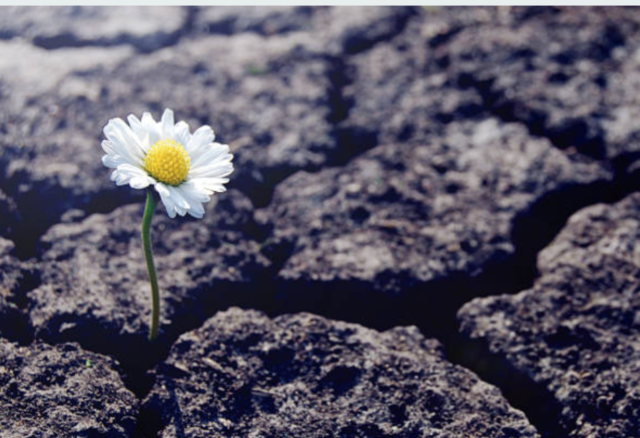
Understanding Post-Traumatic Growth By Alec Hill

The Beautiful Truth About Post-Traumatic Growth
There is a beautiful truth about post-traumatic growth that might be easy for many to miss.
A decade after the Vietnam War, a Yale University research team interviewed American pilots who had been prisoners of war. Despite horrific conditions, 61% reported that they had actually benefited from their captivity. Contrary to expectations, those who suffered the harshest treatment recorded the most positive change.
How could this be possible? Conventional wisdom tells us that trauma is a one-way ticket downward via PTSD (post-traumatic stress disorder). Can growth really be experienced after suffering physical harm, losing a loved one, going through a divorce, or being fired?
Two of the University of North Carolina psychology professors – Richard Tedeschi and James Calhoun – have spent the past 40 years researching this phenomenon. Coining the phrase “post-traumatic growth,” they’ve found that about a third of their traumatized patients experience profound personal growth, a third mild growth, and a third not at all (or even regression).
I’ve suffered through two life-threatening cancers, a daughter who nearly bled to death after being shot in a mugging, and several public failures as a leader. Believe me, I would not want to repeat any of them. But I find myself grudgingly agreeing with Tedeschi and Calhoun – pain can produce personal growth.
In Scripture, productive suffering is often regarded as a pathway to wisdom and holiness. God takes our brokenness, redeems it, and creates new life. James tells us to “consider it pure joy” when we face trials. In the book of Romans, Paul teaches that adversity produces perseverance, mature character, and hope.
Tedeschi and Calhoun have found several common attributes that often emerge post-trauma – including sharper purpose, deeper grit, and enhanced spirituality.
Purpose
Trauma can serve as a reset button. It provides an opportunity to cast away former things, to focus on what’s truly important, and to redirect our lives.
Studies show that while only one in four Americans claim to have a clear sense of purpose, that figure leaps to three of four with cancer survivors. Why the disparity? Harvard professor David Scadden concludes: “People in prolonged peril… are without pretense. Few things make a person more engaged, authentic, and real.”
When our lives are profoundly disrupted, we are given a window for deep self-examination. Tedeschi and Calhoun label this process rumination. They advise: “The challenge is to take the opportunity presented by this earthquake. Don’t just rebuild the same crappy building you had before. Why not build something better?”
Post-bone marrow transplant, I spent a year in isolation. In that odd season, my life’s direction was totally reassessed. With the guidance of the Holy Spirit, clarity formed around a new vocational purpose – investing in rising leaders.
Grit
A mixture of tenacity, perseverance, passion, and toughness, grit is unconsciously nurtured. Whether through public failure and/or private pain, we limp towards this virtue. While I wish the route were easier, we seem to experience the most personal growth via difficult journeys.
In a landmark book profiling 400 famous persons, Victor Goertzel discovered that 75% of his subjects came from dysfunctional homes. Apparently, early childhood difficulties had a “steeling effect” that led to extraordinary personal fortitude.
My mom certainly fits this profile. The youngest of six kids, she was only ten years old when the family farm was lost and her father disappeared. Yet she went on to lead a remarkable professional life and be a wonderful parent.
Spirituality
The result of Tedeschi and Calhoun’s research that surprised me most is that “spiritual change” is normative for trauma survivors. Rather than moving away from God, most of us develop a deeper faith.
In addition, more than 100 studies by scholars at prestigious institutions have found that those with a deep faith are much more likely to emerge from trauma with an enhanced sense of meaning, life satisfaction, self-esteem, harmony, and emotional well-being. This has certainly been my experience.
Compost for Growth
But lest I be misunderstood as trivializing pain’s reality, let me be clear. Trauma is horrible. Full stop.
But it need not be our final chapter. We are not unfixable broken toys. God has made us more resilient than we realize.
Author Gerry Sitzer lost my wife, daughter, and mother in a car accident caused by a drunk driver. Processing grief over many years, he came to see his life as an ecosystem that included every experience – both good and bad. His realized that the soil of his soul contained both nutrition and rot.
Through counterintuitive, flourishing plants emerge from manure. Post-traumatic growth finds its foothold in the compost of our pain.
####
Alec Hill is president emeritus of InterVarsity Christian Fellowship. This essay is exerted from his book, Living in Bonus Time: Surviving Cancer, Finding New Purpose.

September 1 – October 31, 2022
There is still time to register – you won’t want to miss a day of it!
REGISTER TODAY

EARLY REGISTRATION DEADLINE ON AUGUST 31, 2022
RESERVE YOUR SEAT!

What is Christian Leadership Alliance?
Christian Leadership Alliance equips and unites leaders to transform the world for Christ. We are the leaders of Christ-centered organizations who are dedicated to faithful stewardship for greater kingdom impact.
Sign up for FREE blog updates.
Upcoming Events
Check back later!


